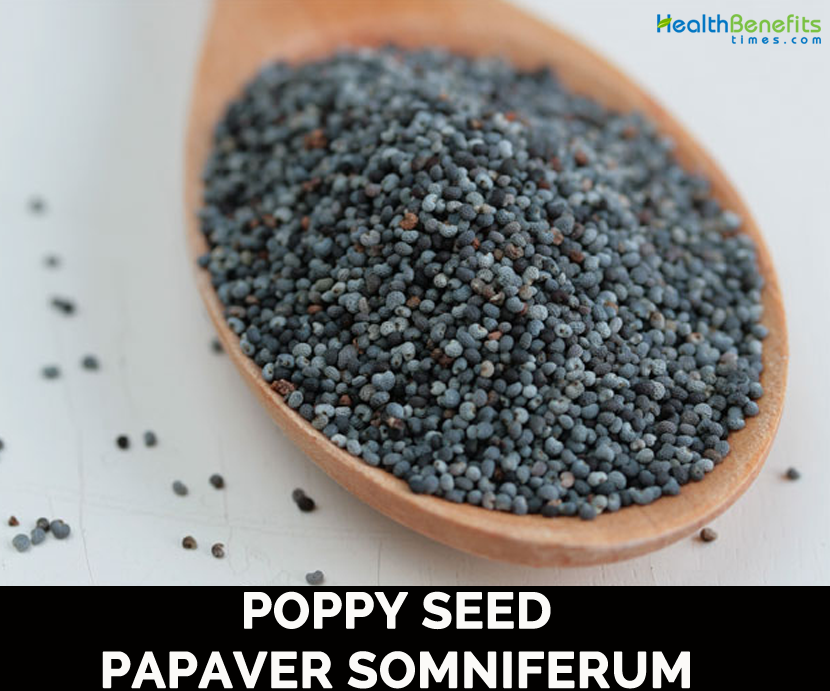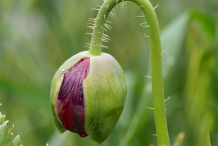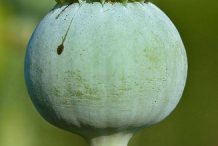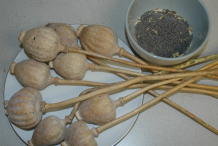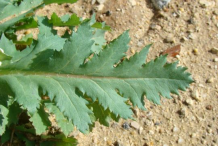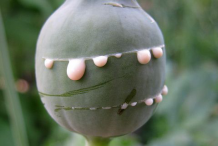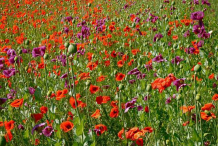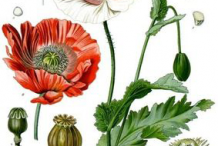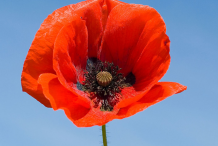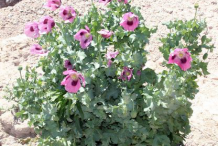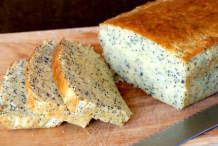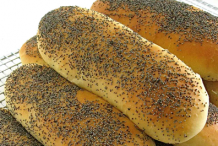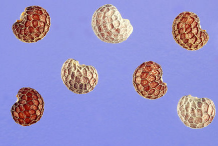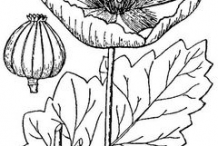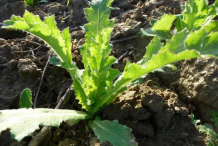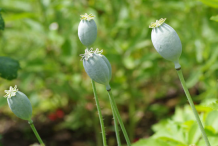The opium poppy is the only species of Papaveraceae that is an agricultural crop grown on a large scale. Other species, Papaver rhoeas and Papaver argemone, are important agricultural weeds, and may be mistaken for the crop. It is also valuable for ornamental purposes, and has been known as the “common garden poppy”, referencing all the group of poppy plants. Poppy seeds are considered an important food item and the source of poppy seed oil, healthy edible oil that has many uses. The seeds are used, whole or ground, as an ingredient in many foods especially in pastry and bread. Up until now, some countries still ban the cultivation and the distribution of this crop.
Plant Description
Opium poppy is a robust annual, glabrous, glaucous, lactiferous herb or small shrub that grows about 1.5 m (4.5 ft.) tall. The plant is found growing in fields, clearings, stream banks, railroads, roadsides, and other disturbed sites. The plant thrives in rich, well-drained soils and tolerates moderately acidic to alkaline soils. Leaves are alternate, lamina is ovate or oblong, 7–25 cm, both surfaces glabrous, glaucous and rather waxy, veins are distinct, slightly raised, base cordate, margin irregularly undulate-serrate, apex acuminate to obtuse; lower leaves are shortly petiolate but upper leaves are sessile and amplexicaul.
Flower & Fruit
Flowers are large, showy, 5–12 cm across, strongly cupulate, white, pinkish or reddish, rarely pale violet, with or without a basal dark blotch. Sepals are green caducous, 2–3.5 cm. Petals are twice as large as sepals, obovate- orbicular, with margin usually wavy or variously cut, caduceus. Stamens are numerous with white filaments and yellowish, oblong-linear anthers. Ovary are green, superior, spherical, 1–2 cm across, glabrous with 4–18 parietal placentas and many ovules and with 5–12 (−18) stigmas united into a compressed disk with deeply crenulate lobes. Fruit is a distinctive capsule, spherical or oblong, up to 4–6 cm in length and 3–4 cm in diameter, with small holes in the top. The capsule is green when it is forming and turns brown when mature and are crowned by stigmatic disk. Fruit consists of many, edible tiny, kidney-shaped seed that are globose to reinform, reticulate, deep gray to black colored. Though there is a white-seed cultivar from India. Average seed numbers per plant can range from 10,000 to 60,000. Poppy seeds are considered an important food item and the source of poppy seed oil, healthy edible oil that has many uses.
History
Opium poppy is generally supposed to have originated from Asia Minor but its exact place is unknown. Opium poppies are probably one of the earliest plants cultivated by men in Europe since the Neolithic era and represent one of mankind’s oldest medicinal plants. The plant has been domesticated by the Sumerians, Sumerian, Assyrians, Egyptians, Minoans, Greeks, Romans, Persians and Arabs. Over the centuries, however, it has been taken extensively into the Far East including India, Northern Burma and Thailand and China. Up until now, some countries still ban the cultivation and the distribution of this crop.
Types
There are different varieties of poppy seeds. Some of the popular types are:
- Blue poppy seeds It is also called European poppy seeds as they are mostly seen on Western breads and in confectionery.
- White poppy seeds It is also called Indian or Asian poppy seeds, they are featured in the respective cuisines.
- Oriental poppy seeds It is also called opium poppy, this one yields opium and is grown for commercial purposes.
Health Benefits of Poppy Seeds
Poppy seeds have a wide range of benefits. They act as a cure for sleeplessness and mouth ulcers and enhance digestion. Poppy seeds even improve female fertility to a large extent and can also aid in cancer prevention.
1. Prevent Cancer
Genes of opium poppies had shown promise in the development of a cancer drug. The drug called noscapine was found to fight tumors and even shrink the breast and prostate cancer cells. It can also stop cancer cell proliferation.
According to another Indian study, poppy seeds can increase the activity of a carcinogen-detoxifying enzyme called glutathione-S-transferase (GST) by as much as 78%. This activity of poppy seeds, as per the study, is high enough for the food to be considered potent for cancer treatment. Tincture of the poppy plant is said to treat cancerous ulcers.(1), (2), (3)
2. Cure Sleeplessness
Consuming a poppy seed drink reduces the levels of cortisol in the body. This led to a calming effect as the stress levels eventually went down. More interestingly, the circadian rhythms in the test subjects showed a marked improvement. Also, the individuals felt less fatigued. Opium poppy is known to be particularly effective in inducing sleep. But exercise caution while giving it to kids. Consult your doctor before doing so. Simply take poppy seed tea before you go to bed to enjoy better sleep. Just make a paste of poppy seeds and mix it with warm milk. Take it before bedtime. One cup of poppy seed tea would do the trick. (4)
3. Improve Heart Health
Poppy seeds are a wonderful source of dietary fiber, which helps in lower cholesterol levels and eventually improves heart health. As per a study, the cholesterol content in a food item decreased with a higher amount of poppy seed oil. This simply proves that including the oil to your diet can make it more heart-healthy.(5)
4. Help Treat Kidney Stones
Poppy seeds consist of good amount of potassium, one mineral known to offer protection against and even treat kidney stones. However, according to research report, individuals with hyperoxaluria (an excessive urinary excretion of oxalate that increases the risk of calcium oxalate kidney stones) need to limit the amount of poppy seeds in their diet – as the seeds are high in oxalic acid.(6)
5. Have Analgesic Effects
Since ancient times, the seeds have been used as an analgesic or to relieve pain. Even poppy tea (prepared by mixing the seeds in hot water) can offer analgesic benefits as per a health report. The analgesic effects of poppy seeds are especially powerful in the opium variety according to a report by Purdue University. (7), (8)
6. Digestive Help
If you are suffering from constipation or diarrhea, you need fiber in your diet. Poppy seeds have a remarkably high level of dietary fiber, which can help to bulk up the stool or promote peristaltic motion to regulate your bowel movements. They have been directly linked to soothing inflammation and pain, thus promoting normal functioning in your gut.(9)
7. Enhance Thyroid Function
Zinc is one of the minerals the thyroid gland needs for optimal functioning. Poppy seeds can play a vital role in this aspect as they are rich in zinc. Also, iodinated poppy seed oil has been used in numerous parts of the world to treat iodine deficiency –the cause of thyroid dysfunction.(10)
8. Promote Vision Health
As we age, our eyes naturally begin to fail us, but there are certain things we can do to stop this process. Antioxidant compounds are one great way to protect our eyes, but so is zinc, found in significant quantities in poppy, which can reduce the occurrence of macular degeneration and keep our vision strong.(11)
9. Improve Female Fertility
Research has shown that flushing the fallopian tubes with poppy seed oil can boost fertility. Researchers speculate that the oil can dissolve any debris or mucus in the tubes and increase the chances of fertility. The technique, also called hysterosalpingography, had 40 percent of infertile women in the test group achieve successful pregnancies. Not only had that, 29 percent of the infertile women in the group, who had their fallopian tubes infused with poppy seed water, attained successful pregnancies.(12)
10. Help Treat Eczema and Inflammation
Poppy seeds are effective in treating eczema due to their high content of linolenic acid. Poppy seeds, after being soaked in water or milk, can be ground along with lime juice to form a smooth paste. Applying this paste externally helps in treating burns and skin itchiness. It also acts as an effective painkiller by relieving the pain caused by skin inflammation.
11. Aid in Diabetes Treatment
As mentioned before, poppy seeds are high in fiber; they could be a preferred addition to a diabetic diet. And the manganese in the seeds might also aid in diabetes treatment. However, more research in essential for this aspect. Consult your doctor before you take poppy seeds for this purpose.
12. Help Achieve Clear Skin
Poppy seed scrub can help cleanse your skin, making it look clear and blemish-free. You can prepare a face scrub by mixing 2 teaspoons of poppy seeds with curd. Rub the paste gently on clean face and neck in circular motions, massaging for 10 minutes. Wipe your face with a cotton ball and wash as usual. This will provide you with clear skin and a glowing complexion.
13. Boost the Immune System
The zinc in poppy seeds can contribute to a strengthened immune system. Seeds also enhance the production of immune cells in the body. And the iron in the seeds also helps in this aspect. The zinc in the seeds also helps ward off lower respiratory ailments.
14. Strengthen Bones
Poppy seeds are rich in calcium and copper. While the former improves bone health, the latter strengthens the bones as well as the connective tissue. Seeds are also rich in phosphorus, which, along with calcium, makes up part of the bone tissue. And the manganese in the seeds aids the production of collagen, a protein that defends your bones from severe damage.
15. Cure Mouth Ulcers
Though there is limited research on this, anecdotal proof suggests that poppy seeds can help cure mouth ulcers. Poppy seeds are known to have a cooling effect on the body, which plays a role in mouth ulcer treatment. Simply mix some crushed dry coconut, powdered sugar candy, and ground poppy seeds. Shape it into a pellet and suck on this for instant relief from mouth ulcers.
16. Improve Brain Health
Brain requires essential nutrients like calcium, iron, and copper – minerals that poppy seeds are rich in. These minerals aid in the regulation of neurotransmitters and enhance brain function. Poppy seeds might also cut the risk of cognitive disorder. However, further research is necessary in this aspect.
17. Relieves Body Pain
Poppy seeds consist of analgesic properties that can relieve various body pains effectively. Poppy seeds were widely consumed in the form of teas to alleviate pain and factors associated with it. If you encounter headaches frequently, you should try sipping on some warm tea made with it. However, don’t opt for a home remedy in case of a migraine and consult with your primary care physician in this regard.
18. Help Treat Dandruff
Dandruff is a common problem which, if left untreated, can lead to hair loss. For treating dandruff, you can apply a mixture of soaked poppy seeds, hung curd, and a teaspoon of white pepper on the scalp. Leave the mixture on for half an hour and then rinse it off. Regular usage of this pack will considerably reduce the recurrence of dandruff.
19. For Psychological Health
You can rarely find foods that contain components to improve your psychological health. Poppy seeds are one of them as they are loaded with nutrients such as copper, iron, and calcium. When consumed regularly, the nutrients will regulate neurotransmitters that will improve cognition and concentration. Moreover, nutritionists recommend that consuming poppy seeds will delay the onset of age-related diseases like Alzheimer’s diseases and dementia.
https://www.youtube.com/watch?v=tMAzYKUt2l0
Traditional uses and benefits of Poppy Seeds
- Opium poppy consists of a wide range of alkaloids and has been a very valuable medicine, particularly useful in bringing relief from pain.
- Latex is anodyne, antitussive, astringent, diaphoretic, emenagogue, hypnotic, narcotic and sedative.
- It is an effective remedy in treating nervous disorders.
- It soothes the brain nerves and provides relaxing effects.
- Poppy is an effective cure against cancer.
- It is a good herbal remedy for breast cancer.
- Linoleic acid contained in poppy reduces the risk of heart attack and heart diseases.
- It is useful in treating skin diseases like Eczema, inflammation and itching.
- Paste made of poppy seeds, milk and lime juice cures burning sensation and itching.
- It activates hair follicles and enhances the hair growth.
- It promotes urination and useful in expelling kidney stones.
- It improves the insulin production and keeps the blood glucose levels balanced.
- It reduces cholesterol levels in the blood.
- Poppy is high in dietary fibers which regulates the bowel movements and cures constipation.
- It cures gastrointestinal diseases.
- Plant, capsule, seeds and opium have been used in traditional folkloric medicine in different cultures in Europe, the Middle East and Asia.
- Opium poppy is regarded as astringent, analgesic, anodyne, expectorant, aphrodisiac, antispasmodic, diaphoretic, bactericidal, calmative, carminative, demulcent, emollient, expectorant, hypotensive, hypnotic, narcotic, nervine, sedative, sudorific and tonic.
- Poppy plant has been used in folkloric medicine for asthma, bladder, bruises, cancer, catarrh, cold, colic, conjunctivitis, cough, diarrhea, dysentery, dysmenorrhea, enteritis, enterorrhagia, fever, flux, headache, hemicranias, hypertension, hypochondria, hysteria, inflammation, insomnia, leucorrhea, malaria, mania, melancholy, nausea, neuralgia, otitis, pertussis, prolapse, proctitis, rheumatism, snakebite, spasm, spermatorrhoea, sprain, stomachache, swelling, toothache, tumor, ulcers, and warts.
- Poppy plant, boiled in oil, is claimed to aid indurations and tumors of the liver.
- Tincture of the plant is said to cure cancerous ulcers.
- Plant is considered aphrodisiac, astringent, fattening, stimulant, tonic, and good for the complexion in ayurvedic medicine.
- Dried capsules without the seeds are used to treat cough and diarrhea in Vietnam.
- Dried capsules have also been used to treat cough in Europe and diarrhea and cough in China.
- Capsule decoction and an injection of the seed decoction are claimed to help uterine cancer.
- Fruit is recommended for anemia, chest pains, dysentery and fever in Unani medicines.
- Capsule is regarded as antitussive, cooling, deliriant, excitant, and intoxicant, and an aphrodisiac if freely consumed in ayurvedic medicines.
- Seeds are considered aphrodisiac, constipating, and tonic in ayurvedic medicines.
- Iranians use the seed for epistaxis; a paste made from Linum, Malva, and Papaver is applied to boils.
- Chinese in Peninsular Malaysia have used the seed medicinally in the treatment of nausea, vomiting, fluxes and fevers.
- Opium has been reported to be used as a remedy for such cancerous conditions as cancer of the skin, stomach, tongue, uterus, carcinoma of the breast, polyps of the ear, nose, and vagina; scleroses of the liver, spleen, and uterus; and tumors of the abdomen, bladder, eyes, fauces, liver, spleen, and uvula.
- Opium is unexcelled as a hypnotic and sedative and is frequently administered to relieve pain and calm excitement.
- As astringent, it is administered for diarrhea and dysentery.
- Externally, opium has been applied for hemorrhoids, for leprosy and in wound of the eyes.
- Opium has been used in Lebanon to quieten excitable people, to relieve toothache, headache, incurable pain, and for boils, coughs, dysentery, and itches.
- Algerians pack opium into tooth cavities to relive pain.
Ayurvedic Health benefits of Poppy Seeds
- Hair fall: Grind Opium seeds milk. Apply it over the head.
- Diarrhea: Take 3 g seed powder of poppy with warm milk. Have it once a day. OR Powder the roasted seeds of powder. Take quarter tsp of it with honey.
- Insomnia: Take half tsp poppy seed oil before going to bed at night. Have it thrice a week.
- Coolant: Grind poppy seeds to make paste. Consume 2 g of it daily with lukewarm water.
- Kidney Stones: Take 4 g poppy seeds with warm water. Its regular use stops the formation of kidney stones.
- Dark circles: Crush seeds of poppy to make paste. Apply it below the eyes. Use it regular to get rid of them.
- Itching: Apply poppy seed paste over itchy areas.
- Snoring: Dip one tsp of poppy seeds in water for 5 hours. Chew them with lukewarm milk at night.
- Obsessive compulsive disorders: Take 3 tsp of poppy seeds and soak them overnight in water. The next morning, grind them to make a fine paste. Consume it daily.
- Aphrodisiac: Poppy seeds when smoked increases sexual performance. Simply put a tbsp of poppy seeds in the fire and inhale its smoke.
- Ringworm: Make a paste of vernonia cinerea, poppy, black cumin, dry coconut powder. Apply it for three hours. Wash it off with Luke warm water.
- Hoarseness: Prepare a decoction of poppy seeds and caraway seeds by taking them in equal quantity. Gargle with it twice a day.
- Sore Throat: Take 2 tbsp of coconut milk, 1 tbsp of poppy seed powder, 2 tbsp of honey. Mix all the ingredients. Have one tsp with milk at night.
- Amebiasis: Take 2 g each of black pepper, asafoetida and poppy seeds. Grind them to make powder. Divide them in 10 parts. Take 1 pill four times a day.
- Dizziness: Soak 25-30 g wheat, 15-20 g poppy seeds, 10-12 almonds, 8-10 water melon seeds in water for half an hour. Heat one tbsp of ghee in a pan. Fry cloves in it. Add all the soaked herbs in it. Take 4-5 tbsp two times a day with milk.
- Diarrhea: Take 20 g poppy seeds, 40 g sugar, 10 g cardamom, 10 g nutmeg, and 20 g tragacanth gum. Grind them to make powder. Take 3 g of the powder after every 3 hours with lukewarm water.
- Dizziness: Soak 8 almonds, 8 pumpkin seeds, 1 tsp of poppy seeds, and 3 tbsp of wheat in water overnight. Grind all the soaked herbs into a paste. Heat 1 tbsp of ghee. Add one tsp of cloves in it and fry. Add the paste along with 100 ml of milk and boil the mixture for 5 minutes. Add sugar to taste.
Other Top Uses Of Poppy Seeds
Let us look at some of the best ways to use poppy seeds.
- Adding Flavor: Poppy seeds are good at adding flavor to a number of food items like breads, rolls, cookies and cakes. You may depend upon these seeds to add delight to your party menus.
- Grinded form: People across the globe make use of ground poppy seeds in dishing up various types of desserts. Grind poppy seeds with other cooking ingredients while making soups, gravies and kormas to enhance the flavor.
- Sauces: Poppy seeds are also utilized as thickening agents for various types of sauces available in the market.
- Cooking: Poppy seeds are also used in cooking different dishes like vegetables, noodles and fishes to add flavor and aroma to these items.
- Opium: Seeds of Poppy plant are store houses for opium, which is considered as a useful ingredient for preparing various herbal medicines. However, criminal minds treat it as a narcotic drug and make illegitimate use of these seeds. Thus, we must make use of opium present in poppy seeds in medicines rather than making drugs.
- Important ingredients: It also offers a number of ingredients, which include thiamine, riboflavin, lecithin, oxalic acid, pentosans and amorphous alkaloid.
- Enzymes: It also helps in enhancing the enzymes like diastase, emulsin, lipase and nuclease in the human body.
- Fatty acids: Seeds are also good sources of fatty acids, especially the omega-3 fatty acids, which are essential by human body to ensure good health..
- Carbohydrates: Poppy seeds may also be considered as good sources of carbohydrates and thus, these are helpful in enhancing the level of energy supplied to human body for routine functions.
- Joint Pain: Make a paste of poppy seeds with water and apply it on the joints with pain and inflammation to get good relief.
- Mouth Ulcer: To get instant relief from mouth ulcers, consume it by adding some sugar to the poppy seeds and crushing it.
- Skin Care: Make your face look radiant and moisturized by applying the paste of raw milk and poppy seeds.
- Insomnia: Mix poppy seeds powder with hot milk to cure insomnia, anxiety and restlessness.
- Improves Appetite: If you are facing loss of appetite lately, has a milkshake or fruit juice to improve your appetite.
- Respiratory Diseases: Get good relief from whooping cough, asthma and other respiratory issues by making a concoction with poppy seeds, water and sugar.
- Itchy Skin: If your skin is itchy or has a burning sensation, make a paste with pre-soaked poppy seeds with lemon juice and apply it on the affected area.
- Dark Circles: Mix a teaspoon of lemon juice and half teaspoon of poppy seeds powder to remove dark circles under your eyes.
- Indigestion: Make an herbal tea by brewing a teaspoon of poppy seeds with hot water and straining it. Mix honey and consume to treat cough, indigestion and cough.
Culinary uses
- Poppy seeds are popular for pastries and baked goods in Turkey and Egypt, and are widely used in the regional cuisines of Central and Eastern Europe.
- Seeds may be used whole, and are often sprinkled as a decorative topping on bagels and breads, or they may be ground into a paste and used as a filling.
- Ground poppy seeds are also used as a thickener in some Indian dishes.
- Oil extracted from poppy seeds can be used in cooking.
- Much used as a flavoring in cakes, bread, fruit salads etc.
- Crushed and sweetened seeds are used as a filling in crepes, strudels, pastries etc.
- High quality edible drying oil is obtained from the seed.
- Poppy seeds are commonly used in food items such as bagels (ring-shaped bread), bialys (Yiddish bread roll) pretzels, muffins, and cakes.
- Poppy seeds are used as filling ingredients for homnetash (Yiddish pastry) and strudel pastries.
- Poppy seeds can be dry roasted and ground to be used in wet curry (curry paste) or dry curry used in chapattis and in chutneys.
- They impart a creamy and nut like flavor, and when used with ground coconut, poppy seeds provide a unique and flavor-rich curry base.
- Poppy seeds fried in butter can added to noodles or pasta.
- Poppy seeds can be added to vegetable sauces such as asparagus and root sauces; they can be sprinkled on to coleslaw.
- They can be used to top creamed potatoes and au gratin dishes, and used in fish dishes.
- Poppy seed oil known as oillete by the French can be used to substitute olive oil for culinary purposes.
- Oil is used locally in making sweets in some parts of Asia.
- Some native tribes in Southeast Asia consume the young leaves as vegetables.
- Gasagase Payase is a popular dish in Karnataka. It is basically a liquid dessert prepared with white poppy seeds, Jaggery, coconut, and milk.
- Poppy seeds are used for garnishing a special sweet called anarsa, which is prepared during Diwali in Maharashtra.
- Patties made from powdered poppy seeds are often grilled or fried.
- A rice dish can be prepared by simply mixing uncooked ground poppy seeds with mustard oil chopped green chili peppers, and rice.
- Poppy seeds cooked with Jaggery and coconut are enclosed in a case of a flaky pastry and deep fried to prepare a delicious sweet called karanji.
- White poppy seeds paste is used to prepare a masala that is used in preparing exotic dishes with chicken, meat, and vegetables in Andhra pradesh.
- Poppy seeds are used in preparing popular sweet pastry dishes like Strudel and Germknödel in Austria and Hungary.
- Ground poppy seeds are widely used in pastries. Before being used in pastries, they should be soaked in boiling water for 1 to 3 hours before grinding.
- These seeds are best when sprinkled over naan bread and cooked in a clay oven known as tandoor.
How to Buy Poppy Seeds
- Poppy seeds are available in both whole and ground forms. They can also be purchased as poppy seed paste, poppy seed powder and poppy seed oil.
- Poppy seeds are extremely high in polyunsaturated fats which can make them vulnerable and get spoiled. Hence, always buy poppy seeds from a store that guarantees authenticity and freshness.
- Check the appearance of poppy seeds, whenever possible. They should be deep metallic blue in color, with a mild nutty taste and pleasant crunch.
- Ivory, beige, dark grey and tobacco-brown poppy seeds are also available, which give a similar taste and can be used instead.
Poppy Seeds Storage Tips
- Poppy seeds can be stored in airtight containers in a cool, dry, dark place for up to six months. Keep them refrigerated where they will retain their freshness and prevent rancidity.
- When stored at room temperature, the oil content in poppy seeds can become rancid quickly, giving a bitter and unappetizing taste.
Other Facts
- Stem and leaves are thinly covered with coarse hairs.
- All parts of the plant exude white latex when wounded.
- Seed yields 44 – 50% of an edible drying oil.
- Oil is very good for lighting; it burns for longer than most oils.
- Oil is also used in paints, soap making etc.
- Opium poppy plant also has valuable ornamental uses as a garden flowering plant, and its flowers and dried pods are used in various floral arrangement.
- Poppy seeds are use as bird feed.
- Poppy seed oil is a source of drying oil used for the manufacture of paints, varnishes, and soaps.
- Poppy seed are almost exclusively used for the extraction of oil in turkey.
- Nutritious poppy-seed cake or meal left after extraction of the oil is used alone or mixed with other feeds, suitable as food for cattle and other animals.
- Average seed numbers per plant can range from 10,000 to 60,000.
- There are some 900,000 poppy seeds to the pound.
- Dried latex is source of morphine, codeine, papaverine and noscapine. These substances are used in the manufacture of painkillers and cough syrups.
- Opium poppy is also used for the production of heroin. Heroin is a type of recreational drug which induces euphoria and eliminates anxiety. It produces strong addiction.
- Animals can become drowsy, comatose or heavily sedated after consumption of this plant.
Precautions
- This plant contains a number of very toxic compounds, many of which are extracted and used as pain killers etc. in medicine.
- They are also used to make various highly addictive narcotic drugs.
- Excessive may cause death.
- Prolonged use may cause severe addiction.
- In some people, poppy seeds can cause allergies.
- Some of these include vomiting, hives, eye swelling, skin redness, and difficulty in breathing.
- Excess consumption of poppy seeds during pregnancy or breastfeeding can cause issues and must be avoided.
References:
https://www.itis.gov/servlet/SingleRpt/SingleRpt?search_topic=TSN&search_value=18894#null
https://davesgarden.com/guides/pf/go/38366/
http://www.hear.org/pier/species/papaver_somniferum.htm
https://npgsweb.ars-grin.gov/gringlobal/taxonomydetail.aspx?id=406377
https://www.pfaf.org/user/plant.aspx?LatinName=Papaver+somniferum
https://botanical.com/botanical/mgmh/p/popwhi64.html
http://www.floracatalana.net/papaver-somniferum-l-
http://www.theplantlist.org/tpl1.1/record/kew-2561497
https://plants.usda.gov/core/profile?symbol=PASO2
https://www.hort.purdue.edu/newcrop/duke_energy/Papaver_somniferum.html
https://en.wikipedia.org/wiki/Poppy_seed
Comments
| Poppy seed Quick Facts | |
|---|---|
| Name: | Poppy seed |
| Scientific Name: | Papaver somniferum |
| Origin | Southeastern Europe and western Asia |
| Colors | Green when young and turns brown when mature |
| Shapes | Distinctive capsule, spherical or oblong, up to 4–6 cm in length and 3–4 cm in diameter |
| Taste | Bitter, sweet sour, astringent |
| Calories | 46 Kcal./cup |
| Major nutrients | Manganese (25.65%) Copper (15.89%) Calcium (12.70%) Phosphorus (11.00%) Iron (10.75%) |
| Health benefits | Prevent Cancer, Cure Sleeplessness, Improve Heart Health, Help Treat Kidney Stones, Have Analgesic Effects, Digestive Help, Enhance Thyroid Function,Help Treat Eczema and Inflammation, Aid in Diabetes Treatment, Promote Vision Health,Help Achieve Clear Skin, Boost the Immune System, Improve Female Fertility, Strengthen Bones, Cure Mouth Ulcers, Improve Brain Health, Relieves Body Pain, Help Treat Dandruff, For Psychological Health |
| Name | Poppy seed |
|---|---|
| Scientific Name | Papaver somniferum |
| Native | Southeastern Europe and western Asia, and are now widely cultivated in Europe, Asia, China, and North Africa |
| Common Names | Breadseed Poppy, Edible-Seeded Poppy, Garden Poppy, Gear, Maw Seed, Medicinal Poppy, Oilseed Poppy, Opium Poppy, Poppy Seeds, Scag, Smack, Small Opium Poppy, White Poppy |
| Name in Other Languages | Afrikaans: Opiumpapawer, Olie papawer Albanian: Lulëkuqe Amharic: paa-pi, Papi (ፓፒ) Arabic: Abou En Noum, Abunom, A fi un, Bazrul- Khash-Khash, Bizrul Khashkhash, Bizrul- Khashkhash, Khashkhash, Khashkhash Aswad, Khashkhashul Baiza, Nabatul-Khash-Khash, Qishr-Ul-Khashkhash, Qishrul Khashkhash, Qishrul-Khash-Khash, Qishrul-Khashkhash, Ude Saleeb; أ ‘abu alnuwm (بو النوم), abu alnum (أَبُو النُوم) Aramaic : Maikon Argentina : Amapola Armenian: Megon, Megoni Good, Mekon (Մեկոն), Mekoni Kut (Մեկոնի Կուտ) Assamese: Afugoch, Aphu Guti Azerbaijani: Xaş-xaş, Хаш-хаш, Ḫaš-ḫaš Basque: Lobelarr Belarusian : Mak, Opiumny Mak Bengali: Afing-gach, Posto, pasto, posto dana Brazil : Papoula Bulgarian: Gradinski mak (Градински мак), Makovo seme (Маково семе), Opiev mak (Опиев мак) Burmese: Bhainzi Catalan: Cascall, Herba dormidora, Dormidora, Pintacoques Chinese: Ying su (罂粟), Ya pian (鸦片), Ying Suhk Hohk, Ying Su Qioa, dà yān (大烟), yù mǐ (御米) Coptic : Khaulan, Neman Croatian: Vrtni mak, Mak Czech: Mák sety, Mák Danish: Birkes, Opiumvalmue, Valmue frø , Valmue-frø Dutch: Blauwmaanzaad, Maankop, Maanzaad, Slaapbol, Slaappapaver, Heulbol Egypt : Abu El Noom English: Breadseed poppy, Edible-seeded poppy, Garden poppy, Medicinal poppy, White poppy, Opium poppy, Oilseed poppy, Small opium poppy, Wild poppy, Common garden poppy, Common poppy Esperanto: Papavo, Papavosemo Estonian: Magun, Moon, Unimagun Finnish: Uniko, Oopiumiunikko, Pioniunikko French: Oeillette, Pavot officinal, Pavot somnifère, Pavot à opium, Pavot de jardin, Pavot commun, Pavot, Pavot des jardins Gaelic : Codalion, Paipin Galician: Adormideira, Durmideira, Mapoula, Sementes de Mapoula Garo: Aping Bipang Georgian: Khoshkhoshi, Qaqacho (ყაყაჩო), Qaqachos tesli (ყაყაჩოს თესლი), qaqaç̌o, qaqaç̌os tesli, Xoshxoshi, ხოშხოში, ḫošḫoši German: Garten-Mohn, Gartenmohn, Mohn, Opiummohn, Schlafmohn, Schlaf-Mohn, Ölmohn Greek: Aphioni, míkon i ypnofóros (μήκων η υπνοφόρος), Mekon Gujarati: Khaskhas Hebrew: Parag tarbuti, פרג, Pereg Hindi: Afeem, A fi m, A fi n, Afyun, Amal, Aphim, Aphim posta, Doda, Kahs-Khasa, Kas-Kas, Kashkash, Khash– Khash-Ke-Khash, Khash-Khash, Khash-Khash- Ka-Per, Khash-Khash-Ke-Bonde, Post, Posta, Sufeed Srah Hungarian: Mák, Kerti mák Icelandic: Valmúafræ, draumsól, Birki Irish : Poipin Italian: Papavero da oppio, Papavero domestico, Papavero sonnifero Japanese: Keshi (けし), Papi Kannada: Abini, Afeemu Gida, A fi rm, Aphimu (ಅಫೀಮು), Biligasagase, Biligasgase, Gasagase (ಗಸಗಸೆ), Kasakase, Kasakathi Gida, Khasa-Khasi-Gida, Khasakhasi, Khuskhus Kashmiri : Khash-Khash Kazakh: Köknär (Көкнәр) Khasi : Aphim Korean: Yang gwi bi (양귀비), a-pyeon (아편), Apyon, po-pi, Yanggwibi, Popi (포피) Laotian: Za zang, Fin, Ya Yang Latvian: Magone Lithuanian: Aguonos, Daržinė aguona Macedonian : A fi on, Bulka, Mak Malay: Kas Kas Malayalam: Afium, Avin, Karappu, Kasakasa, Kasha-Kashach-Chedi, Kashakasha, Kaskasu Maltese: Peprina Marathi: Afeem, Afu, Aphu, Khas Khas, Khaskhashinche Baend, Khuskhus (खसखस), Posta Mongolian : Namuu Nepalese: Aphim Norwegian: Valmue, Opiumvalmue Oriya: Aphima, Posta, Postak Persian : A fi un, Khash-Khash, Khashkhash, Khashkhash Sufaid, Koknar, Post-E-Koknar, Post-Koknar, Poste Koknar, Poste-Khash-Khash, Postekoknar, Tukhme-Koknar, Tukme Koknar Polish: Mak lekarski, Mak ogrodowy Portuguese: Anfião, Dormideira, Dormideira-brava, Dormideira-das-boticas, Dormideira-dos-jardins, Papoula, Papoula do ópio, Papoila Punjabi: Khaskhas, Post Romanian: Mak snotvornyj, Opijnyj mak, Мак опийный, Мак снотворный, Опийный мак, Mac, Mac De Gradină, Mac Somnifer; Russian: Mak opiinyi (Mak opijnyj), Mak snotvornyi Safaid/Siyah: Afiun, Afyun, Kaknar Nim Kofta, Khashkhash, Khashkhash Safaid, Khashkhashsufaid, Khashkhassh, Opijnyj Mak Sanskrit: Aaphuka, Ahifen, Ahiphena, Ahiphenam, Aphukam, Chosa, Kakasha, Kasabijam, Khakasa, Khas-Khas, Khasa, Khaskhasa, Nagaphena, Phaniphena, Post, Postubejam, Postuvrikshaha, Ullasata Scottish Gaelic: Codalion, Meilbheag Serbian : Mak Slovašcina : Vrtni Mak Slovencina : Mak, Mak Siaty Slovenian: Vrtni mak Spanish: Adormidera, Amapola, Amapola blanca, Amapola real, Herba dormidora, Pintacoques, Ababa, Papaver somniferum, Semillas de Amapola Swedish: Vallmo, Opievallmo, Opiumvallmo, Pionvallmo, Oopiumiunikko Tamil: Abhini, Abini, Acarankam, Apenam, Apin, Apini, Apinicetti, Atilam, Cacavinmayirttali, Casa Casa, Cettanti, Cukkumatantulam, Gasha-Gasha, Gasha-Gasha- Chedi, Gasha-Gasha-Tol, Gashagasha, Iracanatikam, Kacakaca (கசகசா), Kacakacacceti, Kacavanipam, Kannatayacceti, Kasa-Kasa, Kasakasa, Parunkam, Postaka, Postaka-Chedi, Postakai, Postakkaycceti, Posthakkai, Posttakkai (போஸ்தக்காய்), Postukkaycceti, Vellai Postakay Telugu: Abhini (అభిని), Gasagasala, Gasagasala-Chettu, Gasagasalu (గసగసాలు ), Gasalu, Gasugasalu, Kasakasa, Nallamandu, Nallamanthu, Posta-Katol, Postakaya-Chettu, Pōstukāya (పోస్తుకాయ) Thai: Fin, Ton fin, T̂n f̄ìn, f̄ìn (ต้นฝิ่น, ฝิ่น) Tulu: Gasugase Turkish: Hashhash, Haşhaş tohumu, Gelincik Çiçeği, Haşhaş Turkmen : Läbik, Läle Ukrainian: Mak snodijnyj, Mak snodìjnij, М’ак снодійний Urdu: Khaskhash, Kokinar, Koknar Nim Kofta, Opium, Poast Khahkhash, Poast Khashkash, Poast Khashkhash, Poast-I-Khashkhash, Post-EKhashkhash, Tukhm Khashkash, Tukhm Khashkhas Safaid, Tukhm Khashkhash, Tukhm Khashkhash Safaid, Tukhm-I-Khashkhash, Tukhm-I-Khaskhash Safaid Uzbek : Lolaqizg’aldoq Vietnamese: Á Phiện, Anh Túc, Chù Gia Ðình, Co Khoản Nheng, Lão Phèn, Á Phù Dung, Cây Thẩu, Cây Thuốc Phiện, Vây Anh Túc Welsh : Pabi Yiddish: Mon, Mon Mondl, Mondl |
| Plant Growth Habit | Robust annual, glabrous, glaucous, lactiferous herb or small shrub |
| Growing Climates | Fields, clearings, stream banks, railroads, roadsides, and other disturbed sites |
| Soil | Thrives in rich, well-drained soils and tolerates moderately acidic to alkaline soils |
| Plant Size | 1.5 m (4.5 ft.) tall |
| Root | Erect tap root |
| Leaf | Alternate, lamina ovate or oblong, 7–25 cm, both surfaces glabrous, glaucous and rather waxy, veins distinct, slightly raised, base cordate, margin irregularly undulate-serrate |
| Flowering Periods | Jul to August |
| Flower buds | Ovoid-oblong, glabrous, 1–3.5 cm long |
| Flower | Large, showy, 5–12 cm across, strongly cupulate, white, pinkish or reddish, rarely pale violet, with or without a basal dark blotch |
| Fruit Shape & Size | Distinctive capsule, spherical or oblong, up to 4–6 cm in length and 3–4 cm in diameter, with small holes in the top |
| Fruit Color | Green when it is forming and turns brown when mature crowned by stigmatic disk |
| Seed | Many, edible tiny, kidney-shaped seed globose to reinform, small, reticulate, deep gray to black |
| Average seed per plant | 10,000 to 60,000 |
| Taste | Bitter, sweet sour, astringent |
| Plant Parts Used | Capsules, flowers, seeds |
| Available Forms | Whole, ground forms, poppy seed paste, poppy seed powder and poppy seed oil |
| Propagation | From seeds |
| Lifespan | Up to 6 months in refrigerator |
| Varieties |
|
| Major Nutritions | Manganese, Mn 0.59 mg (25.65%) Copper, Cu 0.143 mg (15.89%) Calcium, Ca 127 mg (12.70%) Phosphorus, P 77 mg (11.00%) Iron, Fe 0.86 mg (10.75%) Total Fat (lipid) 3.66 g (10.46%) Magnesium, Mg 31 mg (7.38%) Zinc, Zn 0.7 mg (6.36%) Vitamin B1 (Thiamin) 0.075 mg (6.25%) Valine 0.096 g (4.55%) |
| Health Benefits |
|


